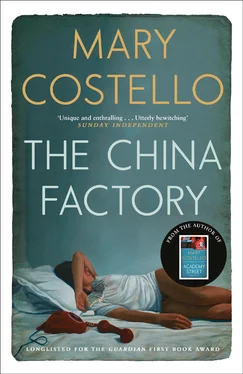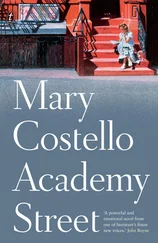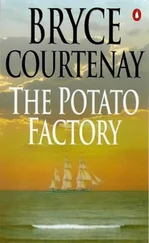He took her hands in his. She made two small tight fists. Slowly, finger by finger, he opened them. ‘I’m real,’ he said softly. ‘I can speak.’ His eyes held hers, imploring her.
The ducks flocked close to the boy.
‘I’ve come all this way. Talk to me… please.’
‘I don’t know what to say. I’m afraid.’
He lifted her hand and kissed it. ‘I wake in the night and it’s you I see,’ he whispered.
She was afraid he would say more than she could bear. She looked away. Must we succumb to every desire, she thought, every appetite? A siren screeched from the north of the Green and startled her. And isn’t the sin in the thought, in the intention, as much as in the act? His eyes were searching her, searing into her, seeing everything. As if he were peeling back her skin, exposing every nerve, reading every nerve’s story.
The siren grew louder. She thought it was coming for her — the ambulance, the police were coming for her. ‘Tell me,’ he pleaded through the siren’s whine, ‘tell me what you want.’
‘I want my hand back,’ she said.
Immediately she regretted the hurt but did not know how to undo it. She needed his mercy then. They looked at each other. She saw what was inside him, his sorrow, his terrible striving. He was striving for something more than her — for the crux of something. He was straining for some centre, some source, something in himself that he was trying to decode. She felt his enormous struggle. She would have liked to lead him to it, and place it back inside him.
‘I brought you a present,’ he said softly and placed a small blue package in her hand.
‘What is it? Thank you. I didn’t…’
‘Don’t open it now.’
He buried his hands in his pockets and looked straight ahead. She leaned in and kissed his cheek. He hung his head, overcome. She moved close, against him, touching the side of his body. They sat completely still. Then he leaned forward, and put his head in his hands. She sensed his withdrawal, felt it as an immense loss. She knew he was moving away, scoping out from her. A new fear began to creep into her. Slowly his conjugal life rose into view. The ordinary days with a wife, children maybe; the nights, sweet and imperfect. The pain that binds people. In those moments she felt the scales tipping. She thought it was all catching up with him here, now, and that he had come to the brink. Suddenly she knew he could not violate that life; he could not inflict that wound. It would mark his heart. She looked up at the trees and watched a leaf fall to the ground at their feet. She could not bear the thought of his sorrow. She could not bear the guilt of his guilt.
‘I have to go now,’ she said.
He turned to her. ‘Please, please don’t go.’ With each word his voice seemed to ebb away. She had an image of him being lifted and placed in her arms, draped over her and she holding him, bearing his weight.
She fled the city on foot. Traffic lights and hard shiny surfaces rose to meet her and the sky pressed down on her. She reached the canal as the first drops of rain began to fall. She floated under trees. She was moving further and further out of his orbit and soon he would no longer detect her.
She rushed headlong into her kitchen and opened cupboard doors and ran water and peeled potatoes. The kitchen sounds penetrated her with their tedious comforting familiarity. She sat down with Adam and they ate in silence. She watched the summer rain fall outside.
Then she climbed the stairs. On the landing she touched her face in the mirror. She sat at her desk and opened his blue box. She lifted out a small silver bracelet with a turquoise stone at its centre and rubbed the stone between her finger and thumb. She saw her reflection in the window. She would never find a word for his loss.
She sat looking out, listening to the rain, for a long time. It would prevail, this astral presence, beyond tonight and tomorrow, beyond next week and next year. Her heart had been recast. What had happened could not be put back. She would endure it.
She switched on her laptop. She would trawl back through his mails now, feel his old words clutch at her one last time, before deletion. She signed in and waited. He was out there in the city, across rooftops, listening to the rain too. The Inbox appeared and there came, simultaneously, the delicate ping that announced new mail and she sat up and the ping lingered — so minute and pure and beautiful tonight, as if a new note had been struck and added to the scale, a tiny secret sign issuing from him, a newfound sound. Her hand trembled on the mouse. She opened his mail, read his newly minted words and felt herself capsize. She closed her eyes. She knew she could not be without him. She remembered his shoulder touching hers, his imploring eyes, and she felt herself again in his gaze — poised, silent, immaterial — and she knew she would die a thousand times at this memory, at this confluence of hearts. She leaned towards the screen and thought it was not an endurance at all, this presence, this plane, and as the night came down and the rain fell on the city it came to her that what this was — this man, this moment — what this was, most of all, was the resurrection of hope.
He hears music when he wakes these mornings. The notes float up from below, pouring softly into the room, and for a moment he thinks it is Miriam, Miriam perched on the piano stool with her legs swinging and the purple-flowered wallpaper swirling around her and the notes spilling from her fingers. He has started to expect it when he opens his eyes each morning and finds the patch of sky out the window. He says nothing to Marie because, of course, there is no music, the music is in his head and Miriam is in Canada, a grown woman living alone in a beautiful glass house set into a wooded hill above Vancouver. When she looks out her windows she can see the Pacific Ocean. In winter her fingers used to break out with eczema. Once, she ran to the end of the yard to call him in for his tea. He was leaning on a gate looking out over the fields. Why are the hills blue, Daddy? Her eyes squinted at the hills in the distance. Because they’re far away, he said. What’s behind them? More hills. I want to see over them . He lifted her up on a rung of the gate. Higher, Daddy . The sun was warm on their faces. Why are you crying, Daddy? He had an urge to take her hand and start walking towards the distant hills. They would rest under the shade of lone trees and then walk on in silence, forever. He wonders if her hands still break out now in the cold of Canada or if she keeps a piano in the glass house.
‘Will you eat a boiled egg?’ Marie asks when he comes into the kitchen. ‘For a change?’
He crosses the tiled floor and steps into the sunlight. He has a small flash of last night’s dream. ‘I don’t think so,’ he says. ‘Just the toast’ll be grand.’
She lifts the teapot from the range. She spreads butter and marmalade, thickly, on a slice of toast, and leaves it on his plate. The sun falls on the pot of marmalade, on the chunky orange peel inside the glass, and his mouth waters. A white cat jumps up on the windowsill outside and hunkers down next to a black kitten. The nine o’clock news comes on the radio and the cat begins to wash.
‘Finish the slice of toast,’ she says and looks him in the eye. ‘Are you not hungry?’
He lifts the toast and bites and chews it slowly. He adds a spoon of sugar to his tea.
‘The surgery rang,’ she says. ‘Kathy said they have the results back. You’re to go up at 12 and he’ll see you.’
He looks at her. She had her hair done yesterday. Her eyes are a watery blue, almost grey, behind her glasses.
Читать дальше












